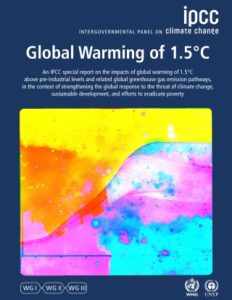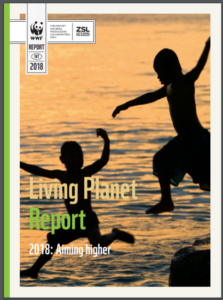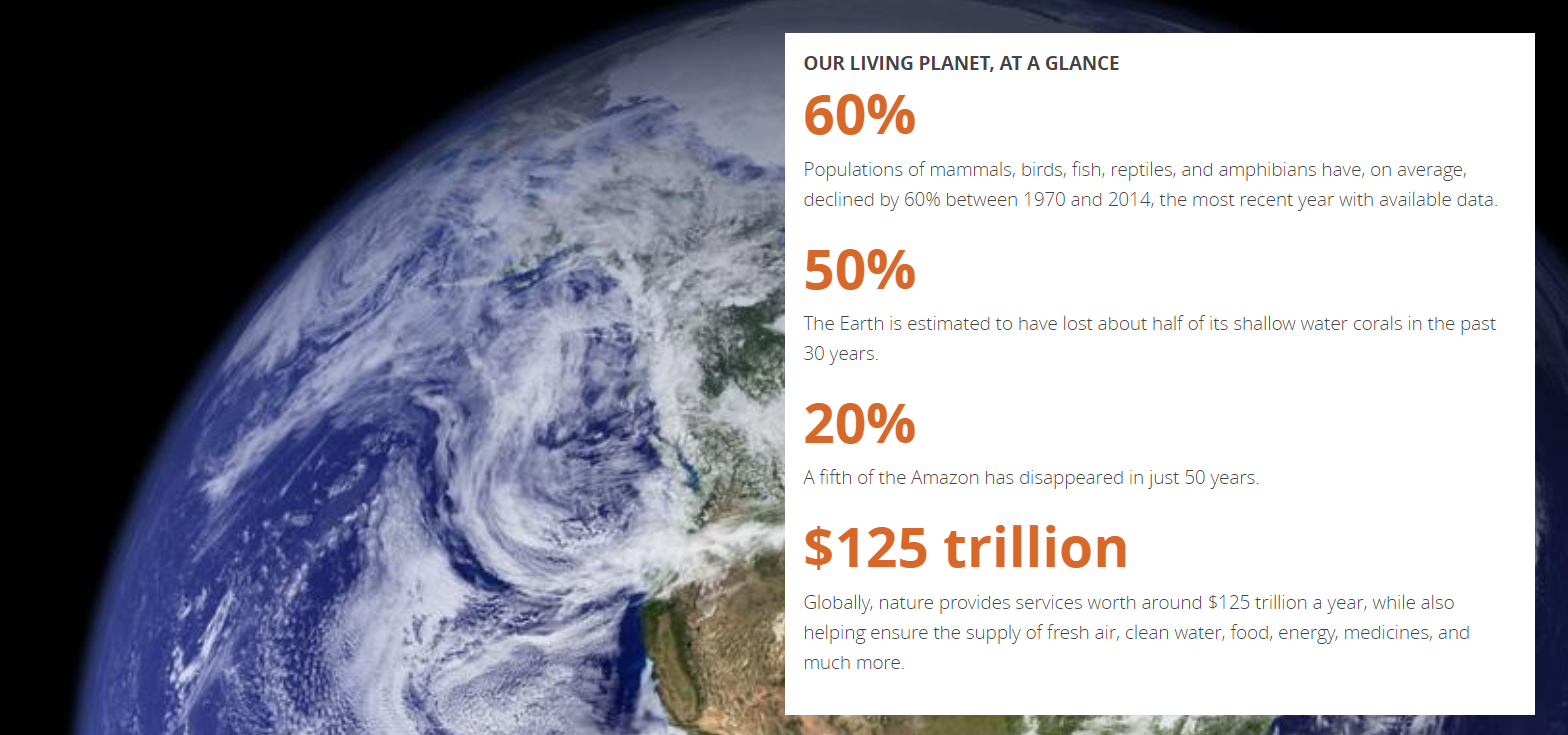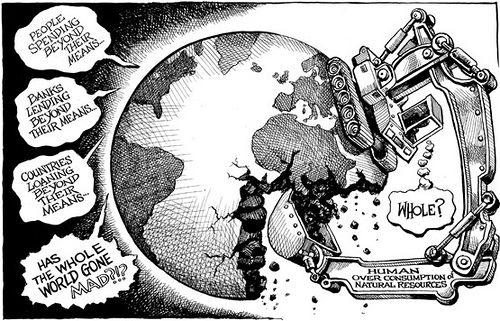By now I think most of us have at least seen headlines related to the recent IPCC update on climate change which describes the impacts of further global warming. To add to this, more recently, the World Wildlife Federation (not to be confused with the wrestlers) released their latest 2 yearly report on the state of our wildlife. Both of these reports are truly shocking in the facts that they present. And it should be noted that although there is some opinion included, these reports are summaries of the best factual data we have on our current situation. If people need more evidence of the sorry state of our global environmental health, it’s all here.
 And let’s be honest with ourselves – in both reports the current situation and the prognoses are both presented as dire situations.
And let’s be honest with ourselves – in both reports the current situation and the prognoses are both presented as dire situations.
And these are not the kind of “dire” situations where for example, jobs are lost or economies are down turning or prices are rising or a storm is coming or some of the other crisis events that preoccupy our media all the time. This is on a whole other level, like the destruction of the planet level. I don’t know whether humanity has ever before knowingly faced such a huge imminent problem and responded with such an apparent lack of urgency.
Is this sinking in at all?
For those who are perhaps climate change sceptics or merely indifferent to it all, and feel that consequences that are still years away are not to be taken too seriously, then the WWF report makes our situation clear and the cause of this situation even clearer. The report directly blames our consumption habits: “Runaway consumption has decimated global wildlife, triggered a mass extinction and exhausted the Earths capacity to accommodate our expanding appetites”
As the head of the WWF declares ominously in the report, “we are the first generation to know we are destroying our planet and the last one that can do anything about it”.
Why are we not all talking about this with the urgency it deserves ???
Why is our media not saturated with more discussion on this?
For some perhaps these are just yet more of the same kind of reports that preach doom and gloom, and that we need to do our best to not get dragged down by. But for those who are listening to the message contained here, there is a lot to be very worried about now and alot that we should be taking far more drastic action on.
We are clearly in a crisis situation that we are either paralyzed to act on or simply too self-absorbed to even notice despite the very clear warnings we are now getting.
It seems like most of us are hearing this message and choosing to believe that life will just go on as normal, the way it always has. Perhaps we are tending to make a subconscious decision that we can’t affect this with our individual habits anyway or that if it really was such a big deal wouldn’t our government be taking more radical action on this on our behalf?
This thinking is starting to look very foolish and delusional.
Mrs Wemakedo has recently gone back to school for some new learning on environmental engineering and so she has been reading a lot of the latest thinking on the state of the environment and latest efforts to mitigate our destructive impacts. So we have been discussing some of these concepts at home a little more and let’s just say that a quiet air of foreboding has begun to set in for us.
On some level, it’s consoling at least to see the huge amount of investigation, analysis and planning that is taking place in various fields of industrial and commercial activity to try to get a handle on the environmental side effects of our economic activity. But this seems minuscule in comparison to the huge momentum already built up by the destructive methods we have engaged in unchecked for so long now.
The latest IPCC report is attempting to put in clear terms what needs to happen to avoid near certain disaster for much of the world’s population. It lists climate-related risks to health, livelihoods, food security, water supply, human security and economic growth. That pretty much covers a lot of what we consider important in life, so maybe we should listen harder this time? Avoiding these catastrophic scenarios will require far-reaching and unprecedented changes in society!!
The WWF report is equally stark. Since 1970, we have now wiped out an estimated 60% of all creatures with a backbone (vertebrates) due to our unrelenting destruction and pollution of the environment.
 A little background on the IPCC report: this report was commissioned in 2015 after the Paris Climate Accord when it was not really clear what would happen if the world were to limit the global temp increase to 1.5C above pre-industrial temperatures (before 1900) versus limiting it to 2C. This report was requested to go figure out the real world scenarios in both cases.
A little background on the IPCC report: this report was commissioned in 2015 after the Paris Climate Accord when it was not really clear what would happen if the world were to limit the global temp increase to 1.5C above pre-industrial temperatures (before 1900) versus limiting it to 2C. This report was requested to go figure out the real world scenarios in both cases.
It doesn’t sound like much but keep in mind we are now (2017 data) believed to be at about 1C higher (within 0.8 to 1.2C (– high confidence)) already and accelerating! Some climate scientists are adamant that we are even higher if a less conservative analysis is applied to the available temperature data.
The CO2 level is not static or even slowly rising – this is actually ACCELERATING according to the latest data collected.
The report makes it clear that if we stopped emitting CO2 now, that is, immediately went to a zero Carbon society across the globe, that the impacts of what we have done will persist for decades and likely millennia in the form of environmental damage. If you pause and think about this it’s very worrying in itself…but then consider how well we are doing at slowing this down for the future.
It’s simply not happening.
As one researcher said “we are sleepwalking to a disaster with climate change”. And here is where the really concerning findings occur.
If we were to limit the damage to the scenario of a 1.5C increase then we would have to be at zero Carbon output by 2050!. That’s dropping from the highest CO2 output levels we have ever experienced to zero in just over 30 years!
The report estimates that we will reach 1.5C above pre-industrial levels (from the current 1C) by somewhere between 2030 and 2052.
So in the next 12+ years, we will see the far more serious consequences of this unchecked behaviour.
Let’s take an example from the report to get some idea of what this could mean. At the 1.5C mark, it is estimated that we lose 70 to 90% of the worlds coral reefs…that’s 90%!.
At 2C, this goes to 99%. No more coral reefs.
For many of us, it’s hard to identify with this as we likely won’t suffer much directly from having no more coral reefs – those pretty features favoured by underwater documentary makers. But to say that we might just be about to permanently kill them all off without much of a second thought is distressing. For those with children, imagine how you would explain this to your kids….”yeah, we knew it was happening but didn’t seem bothered enough or organized enough about it at the time to do enough to stop it”.
The report even mentions the use of extreme “geoengineering” as one possible solution to be considered given the dire situation we face. A quick internet search reveals that this is not a new concept to try to tackle the problem but is one that is now being mentioned more frequently as those in the know realise that this intractable problem looks to be one that is just that – intractable. We really just can’t seem to help ourselves.
One of the geoengineering ideas floated is to fill the clouds with Sulphur to mimic what happens after major volcanic eruptions when sulphur dioxide is ejected into the atmosphere and converts to sulphuric acid which is then able to reflect back lots of sunlight leading to a large temperature drop. It has worked during previous large-scale eruptions so could possibly be made to work artificially. However as these articles point out, if this could be done and if it was to work, this would only buy some time to fix the underlying CO2 generation problem but if you stop doing this engineering without having changed the background CO2 problem then the sudden temp change would have “disastrous effects” on our climate. It’s a last resort option to avoid the 2C temperature rise scenario, and one that needs a lot more figuring out, but maybe we need to start thinking in terms of last resorts now.
ref : https://earther.gizmodo.com/the-machines-that-could-darken-the-sun-to-stop-climate-1825452265
The world is full of legacy systems and methods that have been handed down to us as “the way things are done”. Knowing the way to do things from our predecessors allows us to go further and make progress in different areas without having to spend time relearning the basics. It’s how we progress
But then we also know the benefits of being able to disrupt the status quo with innovative thinking – take for example the prestige associated with an entrepreneur realizing that they can achieve some economic output in a far better way than before. These people are our modern day heroes.
Shouldn’t this disruptive spirit be channelled more urgently towards this crisis situation we face?
We have adopted some truly terrible ways of doing things that we seem to be unable to even acknowledge, much less be bothered trying to disruptively change them. Unfortunately, there are many agents who are incentivized to ensure that you don’t think too hard about some of these behaviours and question the methods that have been handed to you as, simply, “the way things are done”.
Think about the way cigarettes were sold to the public and how long it took before the medical evidence was able to break through the momentum this industry had built up on the back of high profits.
Think about the way cars are sold to us as, electronics and so much of the other crap we digest at increasing rates.
Think about the consumption of non-essentials in general. The only model we know seems to be to sell more stuff to more people to make more money. Where is this approach leading us? These reports are laying that destination our clearly for us now in ever more dramatic terms.
We should not be so naïve as to think that the way we are shown to behave by those with strong incentives, is in any way aligned with our best interests. And it would seem that we don’t yet see how closely our own best interests and the environment’s best interests are intertwined. If we were being trashed by hurricane storms with increasing frequency in Ireland would we start to wonder more about why this was happening? Woud we thne feel the need to take more personal action on our daily habits?
Where has our critical thinking gone in order to be able to see what is going on around us at a time when it’s not possible to hide all this evidence any more
Recently we watched a BBC documentary about the damage being done by the fashion industry. It was shocking for two reasons. The first reason was that it has extremely high levels of chemical pollution associated with its processes which seem to be going unchecked and at the same time that industry has managed to trick us into wanting new clothes at much faster rates than before…
so what you may say? many industries have managed to quietly pull this trick on society with their own particular play on our needs and insecurities.
But what was really shocking is how well the fashion industry seems to have managed to keep this one out of the limelight. At least for us as we watched it, we were shocked to realise how bad that industry really is while maintaining a relatively clean image. Remember when we became aware that some clothing companies were using child labour to make clothes, and how quickly public pressure came to bear to try to stop that practice?
Well, all the while the clothing production companies have been quietly trashing their local environments while helping eager high street buyers stay “up to date”. This documentary is worth a watch if you need some more shocking evidence of why a seemingly benign industry is, in reality, doing horrendous damage… second only to transport in the level damage that it does (link)
Taking time to look around, the environment seems like just one of the many problems we face. But as these two reports are clearly telling us, we need to stop ignoring or underestimating the severe consequences of what we are doing to the planet. If there is a solution to this it lies in our individual habits….no self-interested government is going to fix this. On a local level, people may have forgotten that improvements that get made by governments only come about in response to public demand. The urgent change needed will only happen through people taking their own actions to change.
We must realise that the effects of the environmental damage we are doing are no longer far removed from us in the first world. We are in a crisis that now needs an individual response. As both these reports make clear, we are at the point where we may be the last generation that can possibly do enough to reverse this.
We’ve heard the message again and again. How much more convincing do we need?
We shouldn’t need to be forced to act in the best interests of our future.


